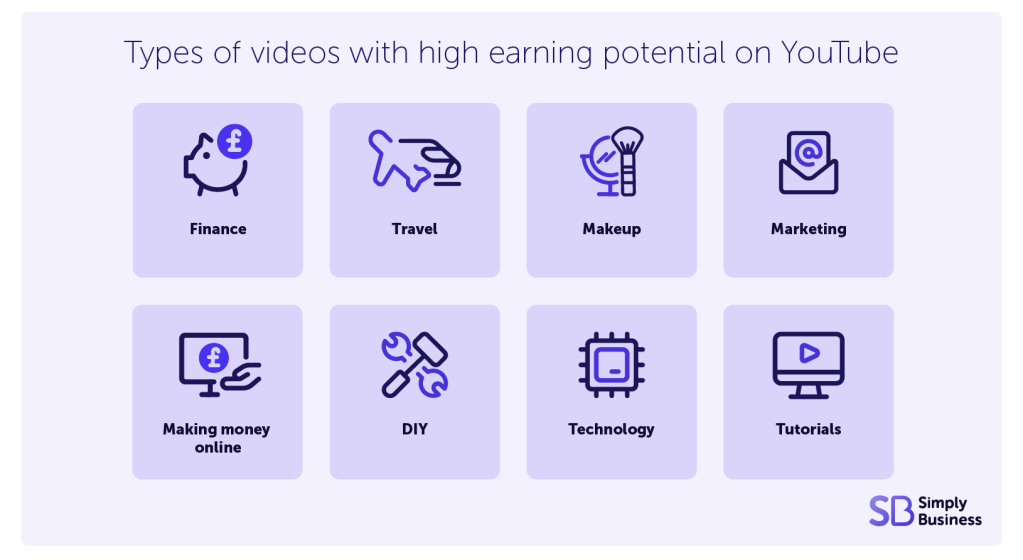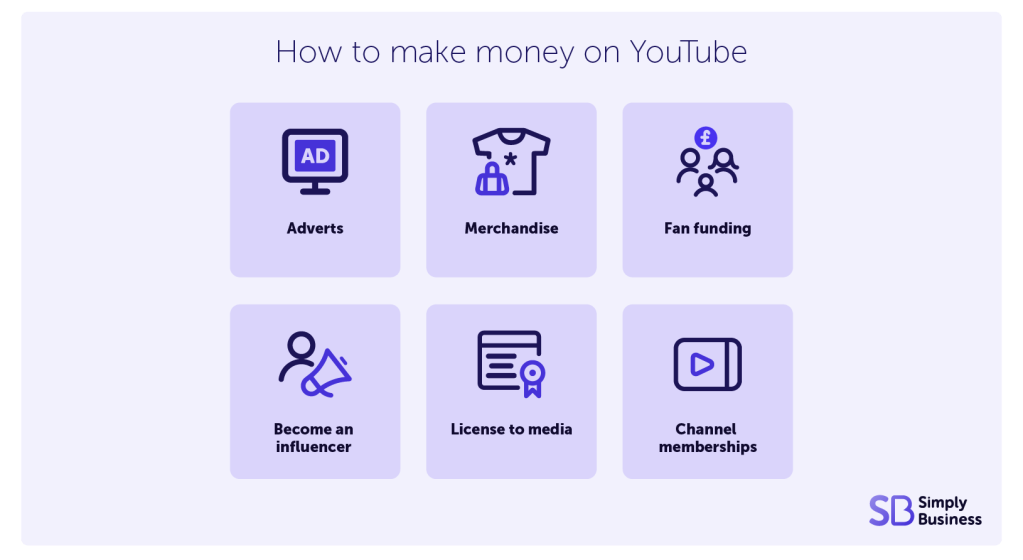With more than two billion active users, YouTube provides plenty of opportunities to monetise content. However, with an estimated 500 hours of video being uploaded every minute, it’s an increasingly competitive market.
If you create video content, it’s likely you’ve already thought about how you can make money on YouTube. Some of the world’s most famous vloggers make millions of pounds from their YouTube channels, but how did they get started?
Read on to find out how to monetise YouTube, from how many views and subscribers you need, to how you can make money in other ways than adverts.
How to make money on YouTube
Before you can start making money from your video content, you’ll need to build an engaged audience. Here’s an overview of some of the things you’ll need to think about:
- identify a target market – knowing who your videos are aimed at will help you to create the right type of video content and start building your audience
- find a niche– if you create specialist content, you’ll be in a better position to attract an engaged audience and work with brands in that sector
- get the right equipment– a good camera, lighting, and microphone can make your videos more professional and appealing to your audience
- use tools to build your audience– you’ll need to post regularly, optimise your videos with keywords, and drive traffic to your channel from social media or blogs
We also have specific guides on social media marketing for small business owners and how to start selling on TikTok Shop.
How do YouTube ads work?
This video from YouTube explains exactly how ads work and everything creators need to know about making money. It covers how to set up ads in your YouTube Partner Program and start earning.
How many subscribers do you need to make money on YouTube?
If you want to start making money from your YouTube videos, you’ll need 1,000 subscribers.
You don’t get paid per subscriber, but the more subscribers you have, the more potential you have to generate revenue.
For example, if you want to become an influencer and work with brands for affiliate marketing, you’ll be paid more and get more opportunities if you have a high number of subscribers.
Related guides
How many views do you need to make money on YouTube?
As well as 1,000 subscribers, you’ll need people to have watched 4,000 hours of your content in the last 12 months to start earning.
The more views you have, the higher your chances of making money. However, you’ll only get revenue if someone clicks or watches the ad on your video in full.
According to Forbes, YouTubers can make an estimated $5 (£3.50) per 1,000 views, meaning a video with 75,000 views would be worth around $375 (£270).
How many views you need will depend on whether you’re solely looking to make money from advertising, and whether it’s going to be a full-time job or a side hustle because you’re a student for example.
How much does YouTube pay in 2024?
Of course, the amount you can earn will vary widely depending on a range of factors, for example:
- category of content
- length of video
- number of subscribers you have
This YouTuber shares how YouTube monetisation works and breaks down how much you could expect to get paid based on his own YouTube earnings and other research:
What type of video should you film?
If you’re wondering what type of video might earn the most revenue for you, Make Money Matt suggests creating content within these categories:
- finance
- travel
- makeup
- marketing
- making money online
- DIY
- technology
- tutorials
These categories are where you’ll find some of the most watched YouTube videos – so fitting into these niches is a great way to start monetising your content.
Perhaps you’re a beautician and want to create makeup videos to earn some money on the side? Or maybe as an electrician you want to share helpful videos for DIY enthusiasts? Whatever your niche, there’s plenty of ways you could use YouTube to make money if you tap into these trends.

You don’t need professional filming and editing skills to make money on YouTube, but it’s worth bearing in mind these tips on how to make a YouTube video if you’re new to this. This covers basic equipment, lightning, and planning, as well as tips for coming up with topics and ideas.
How to join YouTube Partner Program
Once you’ve reached 1,000 subscribers with more than 4,000 hours of your content watched in the last 12 months, you can sign up for the YouTube Partner Program which allows you to include adverts in your videos. Alternatively, you’re eligible to sign up if you have 1,000 subscribers and 10 million views on your short videos in the past 90 days.
Advertisers pay for clicks and impressions and you’ll receive around 55 per cent of the revenue your content generates.
You can set up ads from the ‘Monetization’ feature in the YouTube Studio. From here, you can turn on ads for single or multiple videos.
Your content will need to meet YouTube’s advertiser-friendly content guidelines, and adverts will only start appearing on your videos once they have passed an automated or human review to make sure they meet YouTube guidelines.
From the dashboard, you can then look at your monthly estimated revenue to see how much you could start earning.
What is AdSense?
Once you’re signed up to the Partner Program, setting up an AdSense account is the easiest way to get paid by YouTube.
It’s important to note that YouTube will only pay you once you’ve earned $100 or more from ads on your videos.
YouTube Shorts – are they worth it?
If you’re a part of YouTube’s Partner Program, then you’ll be able to make money from YouTube Shorts.
But it’s worth considering whether they’re the right format for you. It’s harder to make money from YouTube Shorts than it is with longer videos.
The ‘revenue for every 1k view’ (RPM) for a YouTube short is £0.03 while a long form video’s RPM is between £1.28 and £23.23.
But the popularity of short form video content means that it’s certainly a route to consider if you’re looking to grow your audience.
What are the YouTube Community Guidelines?
When you want to monetise your YouTube channel, you’ll need to follow YouTube’s Partner Program policy and its Community Guidelines.
The Community Guidelines are designed to protect users of the site from things like fake engagement, spam, and scams.
There are also guidelines on sensitive content such as child safety, and violent and dangerous content such as cyberbullying and hate speech.
The guidelines apply to all videos, as well as comments, links, and thumbnails.
Can you make money from YouTube in other ways than ads?
For most YouTubers, including adverts in videos is the first step in making money from the platform. However, there are a range of other things you can do which are outlined below:
- merchandise – selling branded items such as t-shirts or tote bags is a good way to make extra money. YouTube even has its own Merchandise Shelf which you can incorporate into videos
- fan funding – once you’ve built an audience, sites like Patreon, Tipeee, and Buy Me A Coffee allow you to receive one-off and recurring donations from fans in exchange for exclusive content
- become an influencer – YouTube affiliate marketing (promoting other brands’ products) can help you to increase your revenue through sponsored posts and discounts codes. Remember to disclose any partnerships and make sure you’re not breaking any government rules on advertising
- license to media – if you post a video that goes viral, news publications or brands can pay you to use the content
- channel memberships – members of YouTube’s Partner Program can charge fans to be members of their channel in exchange for extra content
- chat payments – live streamers can use YouTube’s Super Chat function to receive donations from fans in exchange for shout-outs

Making money beyond ads
YouTube has created this handy video to help creators know how to make money beyond ads. It covers common questions you might have about trying out these monetisation options.
Keep on top of tax and insurance
Once you start using YouTube for business, it’s important to understand your tax responsibilities. You can earn £1,000 tax-free, but you’ll need to pay tax on anything above this. Read our guides on second job tax if you have a side hustle and going self-employed to make sure you’re on the right track.
What’s more, it’s important to have the right insurance in place to cover any risks associated with your work and protect your equipment. Find out more about the business insurance you might need and how it can protect you.
Guides for small businesses and the self-employed
- How to get more followers on Instagram
- An expert guide to marketing for small businesses
- How to do a self-employed tax return
- Why do I need business insurance?
Is there anything else you want to know about how to make money on YouTube videos? Let us know in the comments below.
Looking for self-employed insurance?
With Simply Business you can build a single self employed insurance policy combining the covers that are relevant to you. Whether it’s public liability insurance, professional indemnity or whatever else you need, we’ll run you a quick quote online, and let you decide if we’re a good fit.
Photograph: Bangkok Click Studio/stock.adobe.com
Photograph 2: golubovy/stock.adobe.com

